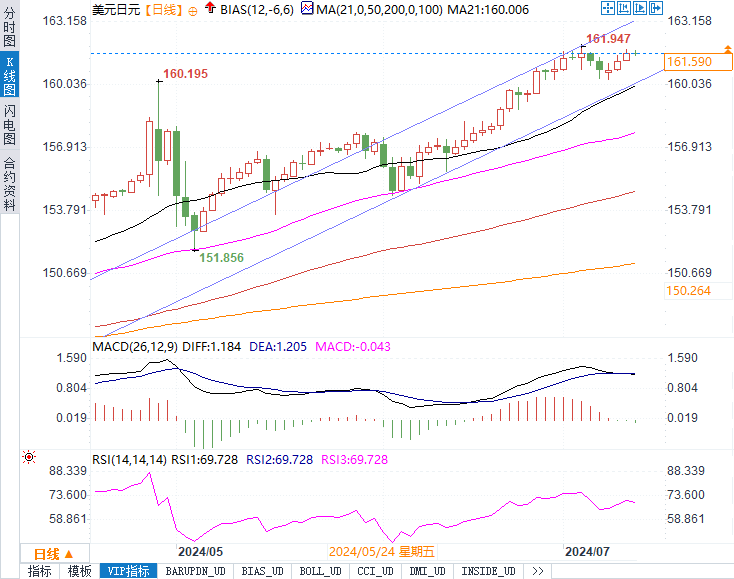Is the yen about to undergo a major reversal? How will the Bank of Japan's policy meeting shake the global market?
As the global financial market focuses on the upcoming policy meeting of the Bank of Japan, the fluctuation of the USD/JPY exchange rate has become the focus of market attention. On July 11th, the US dollar/Japanese yen opened short, hitting a low of 161.61, and then fluctuated around 161.72. Behind this fluctuation is the market's expectation and speculation about the possible policy shift of the Bank of Japan.
The dilemma of the Bank of Japan and its impact on the global market
The Bank of Japan's long-standing ultra-low interest rate policy, as well as its quantitative easing (QE) experiments since 2001, have been stabilizers for global financial markets. However, with the largest increase in basic wages in Japan since 1993 in May, the market began to speculate whether this would be a signal for the Bank of Japan to raise interest rates. This expectation undoubtedly brings new uncertainty to the global market.
Since taking office, Bank of Japan Governor Kazuo Ueda has not implemented significant tightening measures, and even appears relatively conservative in bond and stock purchases. If there is a shift in the policy meeting later this month, whether the global market is ready to embrace this change, especially with the USD/JPY exchange rate testing at the 162 level, has become a thought-provoking question.
The upward channel and potential resistance level of USD/JPY
From a technical analysis perspective, the US dollar/Japanese yen is currently in an upward channel pattern, indicating a bullish bias. Analyst Akhtar Faruqui pointed out that the 14 day Relative Strength Index (RSI) is slightly below 70, which may indicate an overbought situation in the market. If this level is breached, investors may need to remain cautious and alert to potential corrections.
At the upper boundary of the upward channel, the US dollar/Japanese yen may aim at the psychological resistance level around 163.00. If successfully broken through, it will further enhance bullish sentiment and may push the currency pair towards a more important resistance level around 163.50. On the contrary, if it falls below the support level near 160.13 of the 21 day moving average (EMA), it may trigger selling pressure and test the psychological level near the lower boundary of the uptrend channel at 160.00.

Challenges and Policy Expectations of the Japanese Economy
Helen Basil, an economist from a well-known institution, pointed out that although the global economy has performed better than expected, the Japanese economy is facing challenges. The second revision of GDP data shows that the contraction at the beginning of the year was larger than previously expected, and the yen exchange rate fell to its lowest level since mid-1986. These factors have increased the complexity of the Bank of Japan's policy shift.
The Bank of Japan's Tankan survey shows that although business confidence remains stable, the flat retail sales conceal the weakness of non manufacturing industries, especially service providers. In addition, the Japanese political arena is brewing a change that requires decision-makers to change the way they handle the yen. Since Prime Minister Fumio Kishida took office, the Japanese yen has fallen by 31% against the US dollar, and the weakness of the yen has played an important role in maintaining Japan's inflation rate above the central bank's 2% target.
Institutional analyst perspective: Expectations of policy changes and market reactions
Sho Nakazawa, strategist at Morgan Stanley Mitsubishi UFJ Financial Group, said that further depreciation of the yen may trigger expectations for the Bank of Japan to adjust its policies. Economist Richard Katz pointed out that although the interest rate spread was not higher than at the time, the Japanese yen steadily depreciated. These views indicate that the market is highly sensitive to possible policy changes by the Bank of Japan.
The policy meeting of the Bank of Japan will undoubtedly become the focus of global market attention. If the Bank of Japan really adopts tightening measures, whether the global market is ready to embrace this change will be a key issue. Meanwhile, further depreciation of the Japanese yen may trigger market expectations for policy adjustments by the Bank of Japan, which will have a profound impact on global financial markets.
Tips:This page came from Internet, which is not standing for FXCUE opinions of this website.
Statement:Contact us if the content violates the law or your rights
